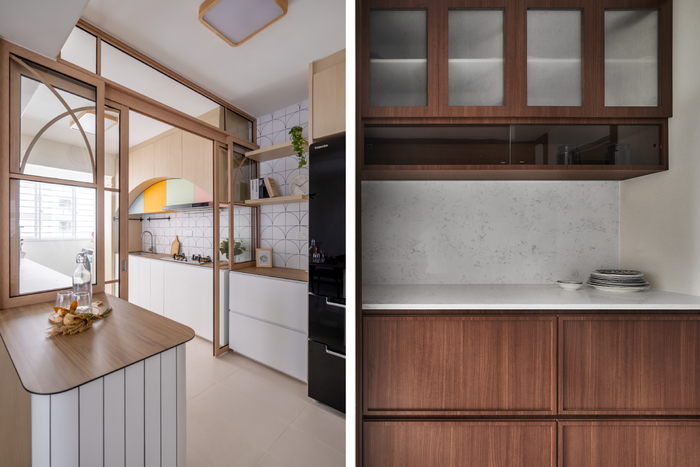What’s the “best value-for-money option” might not be the right choice for your kitchen. We unpack it all here!
When it comes to renovating a kitchen, finding the right countertop should be on the top of your list of things to do. If you make your own meals, you're probably aware that this surface is responsible for much of the heavy lifting when things get busy, whether it’s food preparation or serving as a secondary dining table in an open kitchen.

In any case, there are a number of materials that this hardworking kitchen structure can be outfitted with: laminates, KompacPlus, engineered quartz, solid surfaces, wood and natural stone. Here’s a guide to help you find the right surface for your kitchen.
1. Laminates
In general, laminates are made from several layers of kraft paper boards and melamine resin. This makes them more affordable compared to other surfaces. So, if you’re looking for a budget-friendly option, this is the right one for you.

View this project by The Local INN.terior 新家室
Maintenance is easy and straightforward as well. All you need to keep your laminate countertop in tip-top condition are warm water, soap and a gentle wipe down with a sponge or cloth.
| Pros | Cons |
|
|
Get a laminate countertop if: you’re looking for a pocket-friendly option that is both hygienic and style-flexible.
Local Brands & Suppliers:
2. KompacPlus
Touted as “an alternative to conventional kitchen countertop surfaces”, KompacPlus (or KompacTop) is one durable material that you may wish to consider for your kitchen.

View this project by Le Interior Atelier
You don’t have to hack away your existing countertop finishing to install it either. The KompacPlus can be conveniently mounted over the current counter.
| Pros | Cons |
|
|
Get a KompacPlus countertop if: You are looking for minimum fuss and maximum flexibility.
3. Engineered Quartz
Countertops made of engineered quartz are manufactured by mixing crushed natural quartz with polymer resin. This combination gives it high durability and a wide range of colours.

View this project by The Interior Maison
However, unlike their natural counterparts, engineered quartz surfaces is non-porous. With this surface, you’ll almost never need to worry about tough-to-remove stains or bacterial growth because of water exposure.
| Pros | Cons |
|
|
Get an engineered quartz countertop if: You have sufficient budget and want a tough, maintenance-free, natural stone lookalike.
Local Brands & Suppliers:
- Caesarstone
- Cosentino (Silestone, Dekton)
- iQuartz
- Lian Hin
4. Natural Stone (Granite, Marble)
Since engineered quartz can closely mimic the veiny look and smooth feel of natural stone, are there actually any perks in choosing a granite or marble surface?

View this project by Summerhaus D’zign
We'd say yes. Natural stone countertops are mostly cut from pure stones, they’re eco-friendlier. If you’re someone who’s more environmentally conscious (and have a bigger budget to work with), this is a great option to consider.
| Pros | Cons |
|
|
Get a natural stone countertop if: you want actual stone (and don’t mind doing regular maintenance).
Local Brands & Suppliers:
5. Solid Surface
As their name implies, solid surface countertops are made out of a thick layer of synthetic acrylic. It’s non-porous, germ-resistant and an overall great choice for homeowners who want a zero-maintenance countertop.

View this project by Happe Design Atelier
Solid surface countertops aren’t the toughest material among the options presented but are the easiest to repair. Simply scrub or sand away the scratched/burnt layers to get an (almost) brand-new look!
| Pros | Cons |
|
|
Get a solid surface countertop if: you live with young children and/or pets (or if you’re just accident-prone).
Local Brands & Suppliers:
6. Wood (Butcherblock)
Just like how no two pieces of natural stone look the same, almost no two pieces of wood share a similar pattern. You’ll definitely get a unique look with wooden/butcherblock counters.

View this project by Urban Home Design 二本設計家
That said, it shares the same weakness as natural stone: porous layers. Like always, you can prevent water seepage with a non-toxic sealant.
| Pros | Cons |
|
|
Get a wooden countertop if: you like the warmth of real wood.
Local Brands & Suppliers:
- Custom manufacturers
- IKEA
7. Sintered stone

View this project by Style Elements Studio
Due to their similar designs and properties, many homeowners tend to compare sintered stone with quartz – particularly when it’s about designing their kitchen countertops. But the thing sintered stone has (that quartz doesn’t) is its superior resistance to external elements such as heat and scratches.
Plus, unlike quartz, they’re made with purely natural minerals without pigments or resin. But of course, having all these impressive qualities won’t come cheap, with prices that can be especially daunting to a penny-pinching homeowner.
| Pros | Cons |
|
|
Get sintered stone countertops if: you’re willing (and able) to invest in premium materials.
Local Brands & Suppliers:
This article was first published on 11 Jan 2018 and last updated on 21 Sep 2022.

 Get a budget estimate before meeting IDs
Get a budget estimate before meeting IDs